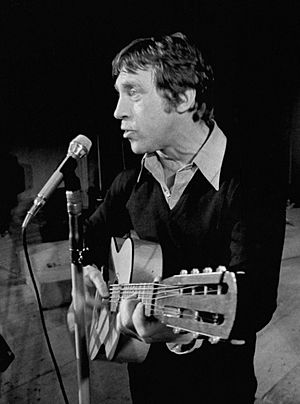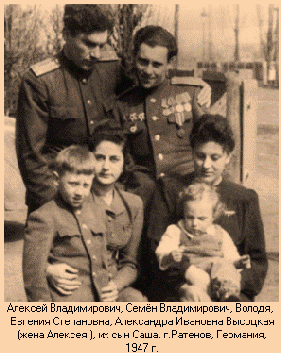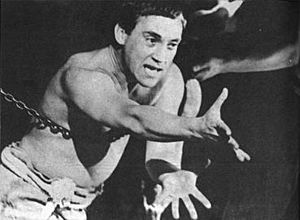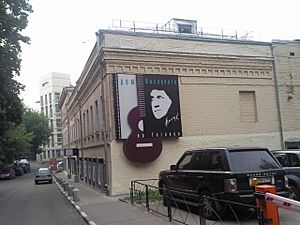Vladimir Vysotsky facts for kids
Vladimir Semyonovich Vysotsky (Russian: Владимир Семёнович Высоцкий; 25 January 1938 – 25 July 1980) was a famous Soviet singer-songwriter, poet, and actor. He had a huge and lasting impact on Soviet culture.
Vysotsky was known for his special singing style and his lyrics. His songs often talked about society and politics, using funny, everyday language. He was also a well-known actor on stage and in movies. Even though the official government didn't always support his work, he was incredibly popular during his life. Today, he still inspires many musicians and actors in Russia.
Contents
Biography
Vladimir Vysotsky was born in Moscow on January 25, 1938. His father, Semyon, was a colonel in the Soviet army. His mother, Nina, worked as a German language translator.
Vladimir showed a talent for acting and poetry from a young age. His grandmother, who loved theater, encouraged him. He would recite poems and even make up funny rhymes. When he was three, he surprised guests by singing street songs. He later wrote about his early life in a famous song called Ballad of Childhood.
When World War II started, his father joined the army. Vladimir and his mother moved away from Moscow for a while. In 1943, they returned to their Moscow apartment. Vladimir started school in 1945.
In 1946, his parents divorced. From 1947 to 1949, Vladimir lived with his father and stepmother, Yevgenya, in Germany. He called her "aunt Zhenya" and they got along very well. He had his own room for the first time. In 1949, he returned to Moscow with his stepmother. He continued school and lived with "auntie Zhenya," whom he considered his second mother.
In 1953, Vladimir became very interested in theater and movies. He joined drama classes. He also received his first guitar as a birthday gift from his mother. A friend taught him how to play basic chords.
Professional Career
In 1955, Vladimir started studying civil engineering at Moscow State University. However, he soon left to become an actor. In 1956, he joined the Moscow Art Theatre Studio-Institute. Here, he met Iza Zhukova, who later became his first wife. He also met Bulat Okudzhava, a popular folk singer.
In 1959, Vysotsky got his first movie role in The Yearlings. In 1960, he graduated from the theater institute. He then joined the Moscow Pushkin Drama Theatre. He faced challenges there, often feeling frustrated by the lack of important roles.
His early films, like Dima Gorin's Career, were not very exciting for him. In 1961, Vysotsky wrote his first real song, "Tattoo." This song began a series of popular songs about the criminal underworld, which were often witty and had hidden social messages.
In 1963, he recorded an hour-long tape of his songs. Copies of this tape quickly spread, and his name became known across Moscow. Many people thought his songs were traditional folk tunes because they were so authentic. By 1964, he had recorded 48 of his songs, which made him a popular underground folk star.
Joining Taganka Theatre
In 1964, director Yuri Lyubimov invited Vysotsky to join the new Taganka Theatre. Vysotsky debuted in The Good Person of Szechwan. At Taganka, he started singing on stage, and war-themed songs became a big part of his music.
In 1965, he performed in The Fallen and the Living, a play about World War II. His songs for this play, like "Stars" and "Penal Battalions," were a new kind of war song in Russia. People found his songs incredibly real, often believing he had experienced the things he sang about, like being a soldier or a prisoner. He always had to explain that he was just an actor and a poet.
In 1966, Vysotsky played the main role in Life of Galileo. This role helped him gain more recognition. Film directors also started to respect his talent. His song "Common Graves" became very famous after being featured in the film I Come from the Childhood.
Rising Popularity
Vysotsky gained widespread fame from the 1967 film The Vertical, a mountain climbing drama. Four of his songs from the film, including "Song of a Friend," became unofficial hits. He continued to work hard at Taganka Theatre, taking on important roles. He also gave many concerts, where audiences saw him as a hero.
In 1967, he played Khlopusha in Pugachov, which was considered one of Taganka's best plays. Around this time, some official newspapers started criticizing his songs, calling them "immoral" and saying they promoted "criminal values." Despite this, his popularity continued to grow.
Two of his 1968 films, Intervention and Two Comrades Were Serving, faced censorship and were not widely released at first. However, his songs like "Save Our Souls" and "The Wolfhunt" became masterpieces. He also started writing more love songs, inspired by his relationship with French actress Marina Vlady.
In 1969, Vysotsky starred in The Master of Taiga and Dangerous Tour. The latter was popular with audiences, who enjoyed seeing him on the big screen. In 1970, he went on a large concert tour and married Marina Vlady. This period was very productive, leading to many new songs like "I Hate" and "The Earth Song."
Later Career and Challenges
In 1971, Vysotsky faced health challenges. Many of his songs from this time talked about mental states. He recovered and went on a successful concert tour in Ukraine. On November 29, 1971, Taganka's Hamlet premiered with Vysotsky in the main role. He played a rebel fighting against a harsh system, which was very powerful.
He was supposed to star in the film The Sannikov Land and wrote several songs for it, but he was replaced because his face was "too recognizable" to officials. One of his songs for the film, "Capricious Horses," became one of his most famous.
In 1972, Vysotsky's film roles included an American journalist in The Fourth One and von Koren in The Bad Good Man. He won an award for Best Male Role at the V Taormina Film Fest. His songs from this time included philosophical pieces like "A Singer at the Microphone" and humorous ones like "The Honour of the Chess Crown."
In 1973, Vysotsky visited Poland and France. He was granted the status of a philharmonic artist, which meant he could officially perform concerts. He also wrote about thirty songs for an audio play called "Alice in Wonderland." His songs "The Others' Track" and "The Monument" reflected on his life and achievements.
International Recognition
In 1974, a small record of four of Vysotsky's war songs was officially released by Melodiya, the Soviet recording company. This was a tiny part of his work, but millions owned his songs on tape. He received an award from the Uzbek SSR and became a member of the USSR Union of Cinematographers. This showed a shift in how the government viewed him.
More films followed, including The Only Road and The Flight of Mr. McKinley. His popularity was at its peak. People could hear his voice from open windows everywhere. He wrote humorous songs like "The Instruction before the Trip Abroad" and philosophical ones like "The Strange House."
In 1975, Vysotsky traveled to France and Mexico for concerts. He also played a major role as Lopakhin in Chekhov's The Cherry Orchard at Taganka Theatre. In 1976, Taganka visited Bulgaria, and 15 of his songs were recorded by a record label there. He also traveled to North America, performing in New York and Los Angeles. He met famous people like Mikhail Baryshnikov and Joseph Brodsky. In a TV interview, he said he was an artist, not a dissident, and loved his country.
His unauthorized trips abroad did not cause problems for him at home. Some high-ranking Soviet officials, like Leonid Brezhnev, admired his work. In 1976, he wrote "The Domes" and "The Ballad of Love." In 1977, his health worsened, but he continued to work.
Final Years
In 1977, three of Vysotsky's albums were released in France. He performed in Hollywood and was warmly received by stars like Liza Minnelli and Robert De Niro.
In 1978, Vysotsky started a major film project, The Meeting Place Cannot Be Changed. He played Zheglov, a tough detective. The film was very popular. He also performed his own songs in Taganka's "Genre-seeking" show and played Aleksander Blok in a radio play.
In 1979, Vysotsky visited America again for successful concerts. However, his health continued to decline. In July 1979, he collapsed during a concert tour and nearly died. In January 1980, he asked for a year off from the theater. He started writing more poetry and prose, and fewer songs. Only one of his nearly 800 poems was published in the Soviet Union during his lifetime. He was never broadcast on Soviet television.
In May 1979, Vysotsky recorded a video message for American actor Warren Beatty, hoping to get a role in the film Reds. This video was broadcast much later, in 2013.
On January 22, 1980, Vysotsky recorded his only studio concert for Soviet television. It was shown eight years later. In his last six months, he performed less often. His health was very poor, but he refused to go to a Western clinic for long-term treatment. He continued to write poetry. His last song was "My Sorrow, My Anguish," and his final poem, written a week before his death, was "A Letter to Marina."
Death
Vladimir Vysotsky passed away on July 25, 1980, in Moscow. He had been struggling with serious health issues.
No official announcement of his death was made, only a small notice in a Moscow newspaper. A note was put up at the Taganka Theatre saying that the Hamlet performance was canceled due to his death. Despite this, millions of people learned of his passing very quickly.
On July 28, he lay in state at the Taganka Theatre. A huge crowd gathered for his funeral, even though the Olympic Games were happening in Moscow at the same time. Tens of thousands of people lined the streets to see his coffin. He was buried at the Vagankovskoye Cemetery in Moscow.
Marriages
Vysotsky was married three times.
- His first wife was Iza Zhukova. They met in 1956 while studying at the Moscow Art Theatre institute and married in 1960.
- He met his second wife, Lyudmila Abramova, in 1961. They married in 1965 and had two sons, Arkady (born 1962) and Nikita (born 1964).
- In 1967, he fell in love with Marina Vlady, a French actress of Russian background. They married in 1969. For 10 years, they had a long-distance relationship. Marina often traveled to Moscow, and Vysotsky's friends helped him get permission to travel abroad to see her. The challenges of their long-distance relationship inspired several of his songs.
Legacy and Remembrance
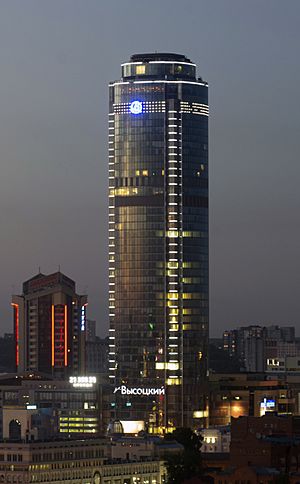
In 1981, Vysotsky's first collection of poetry, The Nerve, was officially published in the USSR. It sold out instantly. More collections followed. In 1981, Yuri Lyubimov staged a new show at Taganka Theatre called Vladimir Vysotsky, which was initially banned but later premiered in 1989.
In 1982, the film The Ballad of the Valiant Knight Ivanhoe featured four of Vysotsky's songs. In 1986, a committee was formed to preserve Vysotsky's poetic works. He was awarded the USSR State Prize after his death.
In 1989, the official Vysotsky Museum opened in Moscow. His grave at Vagankovskoye Cemetery became a place where many fans visit. The monument on his tombstone is believed to be full of symbols from his life.
In 1995, a monument to Vysotsky was officially opened in Moscow. The mayor of Moscow, Yuri Luzhkov, noted that Vysotsky once sang he would never have a monument in such a square, proving him wrong. Another monument was built in Rostov-on-Don in 2014.
In 2004, a monument to Vysotsky was put up in Podgorica, the capital of Montenegro. It shows him with a guitar and a bronze skull, referencing his role as Hamlet. The pedestal has lines from his poem dedicated to Montenegro.
The Vysotsky business center and skyscraper opened in Yekaterinburg in 2011. It is one of the tallest buildings outside Moscow. It has a Vysotsky Museum on the third floor and a bronze sculpture of Vladimir Vysotsky and Marina Vlady outside.
In 2011, a movie called Vysotsky. Thank You For Being Alive was released. It tells about his performances, challenges with the KGB, and a near-death experience in 1979.
Many Russian folk singers have written songs and poems about Vysotsky after his death. Festivals are held every year on his birthday in Russia and around the world. His impact in Russia is often compared to that of famous singers like Bob Dylan in America.
The asteroid 2374 Vladvysotskij was named after him. In 2015, a street in Moscow was named Vladimir Vysotsky Street, after a request to President Vladimir Putin.
The Sata Kieli Cultural Association in Finland organizes an annual International Vladimir Vysotsky Festival. Singers from different countries perform his songs in various languages.
Books About Vladimir Vysotsky
After Vysotsky's death, his wife Marina Vlady wrote a book called The Aborted Flight. It shared details about their life together, his talent, and the challenges they faced. Other important books of memoirs and biographies have also been published, providing insights into his life and work.
Music
Vysotsky's talent is often described by the term "bard" (бард), though he preferred to be seen as an actor and poet. His music became widely known through homemade tape recordings, which spread his immense popularity.
Vysotsky played a Russian seven-string guitar and sang with a unique, raspy voice. His songs were ballads about love, peace, war, everyday Soviet life, and the human condition. He was seen as a voice of honesty, sometimes criticizing the Soviet government. This made him a target for monitoring.
He wrote over 600 songs on almost every topic imaginable. Nearly all his songs are told from the perspective of a character, not directly from himself.
Since he was not officially recognized as a poet and singer, Vysotsky performed wherever he could. He played in theaters, universities, private homes, and clubs. He often gave many concerts in one day and worked late into the night writing. His recordings were rarely released by the official Soviet music company, Melodiya. His songs were passed around through amateur recordings, which helped him become incredibly popular. Even cosmonauts took his music into space.
Musical Style
Most of Vysotsky's songs were written in a minor key. He used a Russian seven-string guitar, often tuned lower than usual. This specific guitar and tuning gave his music a unique sound.
He used his fingers to play the guitar, not a pick, which was common for Russian guitarists. He had different ways of plucking and strumming. He often played an alternating bass with his thumb while strumming with his other fingers.
Sometimes, Vysotsky did not check his guitar's tuning, especially in earlier recordings. Some people believe he preferred his guitar to be slightly out of tune as part of his style.
Singing Style
Vysotsky had a very distinct singing style. He had a unique way of making consonants longer instead of vowels when he held a note in his songs.
Filmography
- 1959: The Yearlings (Сверстницы)
- 1961: Dima Gorin's Career (Карьера Димы Горина)
- 1962: 713 Requests Permission to Land (713-й просит посадку)
- 1962: Shore Leave (Увольнение на берег)
- 1963: Penalty Kick (Штрафной удар)
- 1964: The Alive and the Dead (Живые и мёртвые)
- 1965: Our House (Наш дом)
- 1965: On Tomorrow's Street (На завтрашней улице)
- 1965: The Cook (Стряпуха)
- 1966: I Was Born in Childhood (Я родом из детства)
- 1966: Vertical (Вертикаль)
- 1966: Sasha-Sashen'ka (Саша-Сашенька)
- 1967: Brief Encounters (Короткие встречи)
- 1967: War Under the Rooftops (Война под крышами)
- 1968: Two Comrades Were Serving (Служили два товарища)
- 1968: Intervention (Интервенция)
- 1969: Taiga's Master (Хозяин тайги)
- 1969: Dangerous Tour (Опасные гастроли)
- 1969: White Blast (Белый взрыв)
- 1973: The Fourth (Четвёртый)
- 1973: The Bad Good Man (Плохой хороший человек)
- 1975: The Only Road (Единственная дорога)
- 1975: The Flight of Mr. McKinley (Бегство мистера Мак-Кинли)
- 1976: The Only One (Единственная)
- 1976: How Czar Peter the Great Married Off His Moor (Сказ про то, как царь Пётр арапа женил)
- 1977: They're Together (Они вдвоём)
- 1979: The Meeting Place Cannot Be Changed (Место встречи изменить нельзя)
- 1979: Little Tragedies (Маленькие трагедии)
Images for kids
See also
 In Spanish: Vladímir Visotski para niños
In Spanish: Vladímir Visotski para niños
 | Misty Copeland |
 | Raven Wilkinson |
 | Debra Austin |
 | Aesha Ash |


